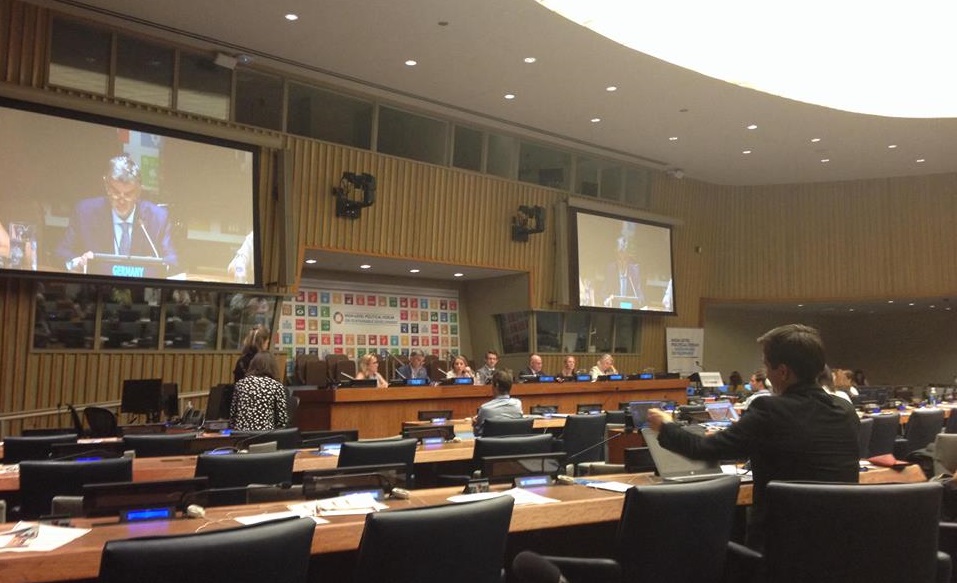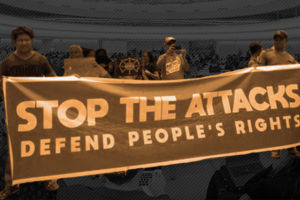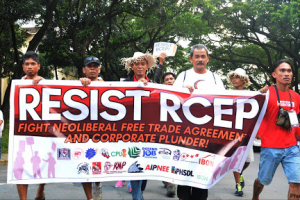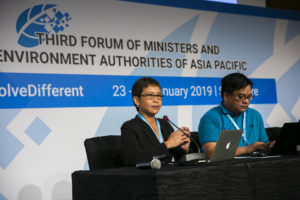[[{“type”:”media”,”view_mode”:”media_original”,”fid”:”2077″,”attributes”:{“alt”:””,”class”:”media-image”,”height”:”583″,”style”:”width: 600px; height: 366px;”,”typeof”:”foaf:Image”,”width”:”957″}}]]Photo: UN Environment Programme side-event on the 2018-2022 plan for "sustainable consumption and production"
At the high-level political forum (HLPF) this year, the progress towards sustainable consumption and production (SDG 12) is part of the main agenda. The HLPF, a forum to review progress on sustainable development goals, is convened annually under the UN Economic and Social Council. “Sustainable consumption and production” in the SDGs include reducing waste, but also supposedly sustainable business practices. These supposedly address both concerns for human needs as well as concerns on environmental deterioration.
The UN Environment Programme (UNEP) held a side-event during the HLPF on making SDG 12 happen as a goal. The side-event featured a panelist from Microsoft, who talked about the supposed positive roles of their products to communities. Both conversations at the UNEP side-event and the official session lent focus on changing consumer behavior, the “circular economy,” various kinds of sustainable products and business, and therefore the essential role that would be played by private sector. As overheard from one of the panelists in the UNEP side-event, “No changes will happen if private companies are not involved.”
The private sector consists 19% of membership in the One Planet Network (OPN), a “multi-stakeholder” group along with civil society, national governments, and science groups. This is seen as the primary political mechanism for implementing SDG 12, including its current 2018-2022 One Plan for One Planet strategic plan.
Private sector role is also seen more generally in the development agenda today. The private sector is always seen as a partner in “multi-stakeholder partnerships” along with governments and civil society. Big international private sector are given importance for the supposed benefits of their buy-in to sustainable development – which could range from implementing, financing development projects, or changing their business practices in such a way as to forward the SDGs. It has been noted that four out of ten companies in the Fortune Global 500 already take the SDGs into account in corporate reporting.[i]
This is complemented by active support of multilateral banks such as the World Bank Group, the Asian Development Bank for better “investment climates” and encouraging private investment – and private interests – in public infrastructure.
Multi-stakeholder partnerships are always within an unequal playing field. Big multinational corporations have the financial, technical and institutional capacities, while other actors – especially civil society – face shrinking spaces for them to engage governments let alone corporations. In particular to “sustainable consumption and production,” there are specific concerns on the role of big private sector, their production practices, and the effects these pose to both communities’ production and consumption patterns.
After all, it is difficult for some communities especially in the global South to forward sustainable consumption and production as stakeholders when they are in hostile political climates: where they are silenced for voicing out concerns on corporate practices and policies that sacrifice sustainability and the people’s right to development in favour of big business.
There are sustainable production and consumption practices by farmers and indigenous peoples groups, for instance, collective and organic farming in the Philippines. The challenge faced by grassroots producers looks like this: in 2017, the Philippines and Brazil have had the highest number of rights violations against land rights defenders, mostly involving mining interests.
The UNEP side-event presented that 40% of the multi-stakeholder One Planet Network is comprised of CSOs (19% from business, 17.5% from national governments). Despite this measure, qualitatively the need persists to create enabling environments of peoples’ organisations that push sustainable livelihoods.
Moreover, it is also important to highlight that environmental and social challenges linked to big business practices have proliferated due to international norms for de-regulation and liberalisation in the global South. These came historically at the expense ofnational policy space that could have halted unsustainable practices for the sake of people’s development. These regulations could have been important especially today, where there is a trend of growing monopoly power. The UN Conference on Trade and Development claims that the top 1% firms of the energy sector captured surplus profits from the norm of privatization during the 1990s and 2000s.[ii] Bayer and Monsanto, corporations that drive pesticide-driven agriculture, are making headway into a mega-merger in the agrochemical and pharmaceutical industry.
Part of the SDG 12 is pushing for national-level policies that are programmed for sustainable consumption and production. But we need to ask about the prospects of this, given current international investment rules willingly adopted by many Southern governments. What are the prospects of changes in companies’ unsustainable practices given this dynamic between international and national level – where multinationals could sue governments at the International Centre for the Settlement of Investment Disputes for affecting profitability, with profits put over environmental concerns?
There is indeed a need for multi-stakeholder approaches in development. But we need to stress just the same the risk for de-contextualizing the conversation from the various impacts of transnational corporations’ activities. We have to go back to the necessity to assess these impacts on both people’s economic rights and climate vulnerability. There is a need globally and especially in the global South for more ambitious policy agenda to render corporations accountable. In the end, the need persists for development paradigms that are owned and led by people’s and grassroots organisations, who in turn could push sustainable consumption and production within the context of systemic change. ###
[i]https://www.globalpolicy.org/component/content/article/271-general/53058-highjacking-the-sdgs-the-private-sector-and-the-sustainable-development-goals.html
[ii]http://unctad.org/en/pages/PublicationWebflyer.aspx?publicationid=2117



